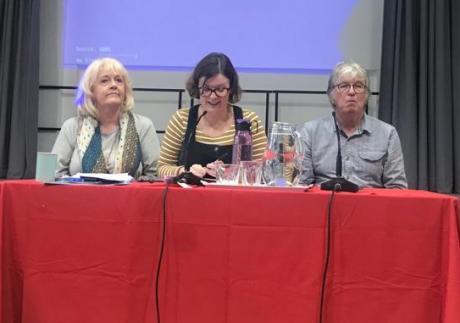The crisis in the housing market is ‘emptying Welsh speaking villages’ - that will be the main message of campaigners at at conference in Aberystwyth today (Saturday, 12th October).
In Ynys Môn, Gwynedd, Ceredigion andCarmarthenshire over the last decade, 117,000 young people between 15 and 29 have left thoseareas, which is over 55% of all the out-migrationfor every age group. It is estimated that Wales is losing aroung 5,200 Welsh speakers a yearthrough out-migration from the country.
In Ceredigion,house prices are more than seven times average wages. Last year, 39% of the homes sold in nearby Gwynedd were either holiday homes or ‘buy to let’ – a rise of 34% from the previous year.
Councillor Loveday Jenkin from Cornwall Council, architect Màrtainn Mac a'Bhàillidh from a Scottish language group and Heddyr Gregory from Shelter Cymru will be among the speakers in the discussion in Aberystwyth organised by Cymdeithas yr Iaith.
Speaking ahead of the event, Jeff Smith from Cymdeithas yr Iaith said:
“Between a lack of jobs and out-of-reach house prices, towns and villages in the West and North are suffering terribly linguistically and more generallu because so many Welsh speakers have to move away. We really need to get to grips with this so that the language can thrive. We need a property system which ensures that house prices reflect what local people can afford. That’s why we’ve decided that housing, including holiday homes, will be the main focus of the conference today.
“From their higher education fees policy which encourages people to leave the country, to sustaining and supporting a housing market with totally unaffordable prices for local people, Government policies work against the language and community sustainability more generally. We hope to learn from other countries what we need to do differently. Some policies in Porth Ia (St Ives) in Cornwall offer an answer to the problems, with restrictions on second homes. But, we need to consider other measures in order to bring prices down. One possible answer is to normalise houses as a public service in public hands rather than a private asset. Bringing the right to buy to an end was a step in the right direction, but how do we bring the present private housing stock back into the hands of local communities?”
He added:
“A number of these problems are because of the way we look at houses, as an asset in a market rather than a public service. It also needs to be realised that unaffordable houses are only part of the reason for the patterns of out-migration and in-migration that are undermining the language in our communities. Our ‘Gwaith i Adfywio Iaith’ (Work to Renew a Language) policies which we published last year offer some simple measures to get to grips with the economic challenges, including recommending establishing local banks with the support of local councils and their pension funds; a tourism levy to support investment in broadband access in every part of the country; abolishing tuition fees for students who stay to study in Wales; devolving hundreds of jobs out of Cardiff; and establishing training colleges for health workers and vets in Aberystwyth and Bangor.”
In St Ives in Cornwall around a quarter of all homes are second homes. Following a referendum three years ago, a new rule was introduced that means no new homes can be bought as second homes.
